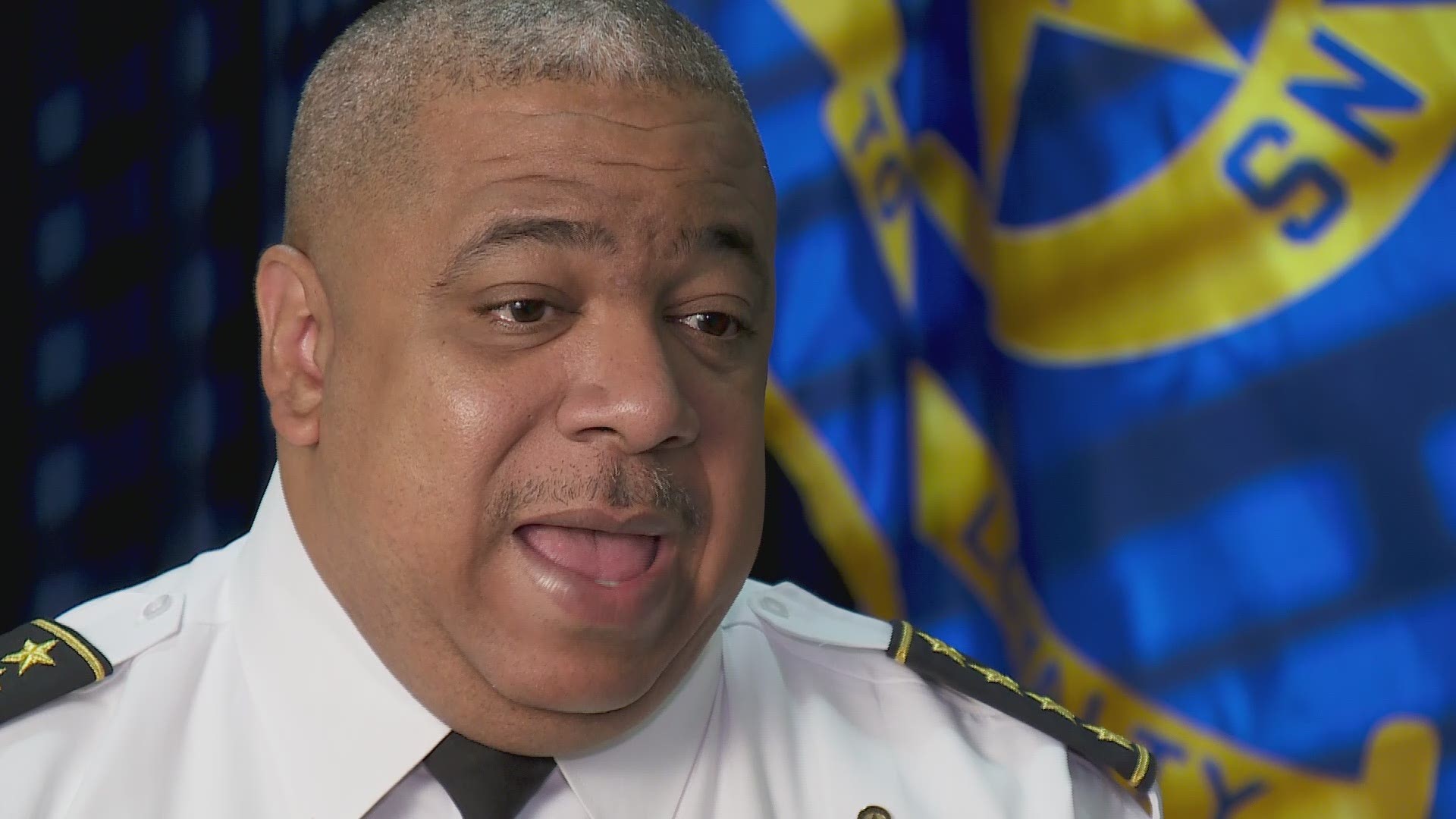NEW ORLEANS -- Christine Villines waited for an officer for more than three and a half hours after another motorist sideswiped her car near City Park last month and then hit several others before driving off.
She finally gave up. If she hadn't called the police back the next day, she said, the wreck might never have been recorded as a hit-and-run.
With average police response times tripling since 2010, reporting crime in New Orleans is increasingly an act of persistence. Officers often arrive to scenes hours late to find victims long gone and, in many instances, mark crimes "unfounded" — meaning that from the department's view, they never occurred at all.
The increasing number of unfounded incidents is almost certainly deflating official crime statistics and making the city appear safer than it really is, according to a joint investigation by New Orleans Advocate and WWL-TV.
Since 2010, the percentage of all incidents handled by NOPD that are marked unfounded has jumped from 10.4 percent to more than 17.9 percent, according to the department's records.
If police wrote reports after they answered 911 calls at the same rate as they did in 2010, an additional 1,332 major crimes — including aggravated batteries, burglaries, robberies and thefts — would have been reported through mid-August of this year. Were all those crimes counted, the crime rate so far this year would be 12 percent higher than what's been reported.
It's impossible to say exactly how many of the calls NOPD deemed unfounded did not, in fact, stem from actual crimes. At least some proportion of 911 calls turn out to be made in error each year.
But it's clear that the increasingly long waits for an NOPD response are having an effect.
Rate of unfounded crimes
Between 2010 and 2012, the rate of unfounded crimes hovered around 10 percent. As response times began to rise the next year, so did the percentage of unfounded cases.
The data show a clear correlation between the length of time it takes for a squad car to arrive on the scene and the likelihood that the call will wind up being deemed unfounded. Less than 15 percent of the calls that police responded to in six minutes or less so far this year have classified as unfounded. But the proportion shoots up to more than 38 percent for calls in which police took more than an hour and a half to arrive.
Overall, the number of calls marked up as unfounded or "gone on arrival" — another designation that doesn't get counted in overall crime numbers and that generally gets little followup — has shot up from 15 percent in 2010 to 24 percent of calls so far this year.
Concerns about crime "downgrading," reducing crime on paper but not in reality, often for political gain, are nothing new. A 2013 Louisiana legislative audit concluded that roughly a third of the serious crimes the office examined should have been reported to the FBI as major crimes but were not.
![IG Ed Quatrevaux [pullquote : 75076346]](/Portals/_default/Skins/PrestoLegacy/CommonCss/images/pullquote.jpg)
There's no evidence that the crimes lost to the "unfounded" category have their foundation in political spin — rather, it appears skyrocketing response times simply mean police aren't able to interview witnesses in many cases.
Inspector General Ed Quatrevaux, who has also issued reports critical of NOPD crime data, said he believes all those "unfounded" calls are almost certainly having an impact on the major crimes the department reports to the FBI.
"We are properly and professionally skeptical of the quality of the data," said Quatrevaux. "How many crimes do we actually have? Of what variety?"
NOPD Superintendent Michael Harrison acknowledged in an interview last month that with response times spiraling, far too many calls are being marked as unfounded. Harrison said that the department will be re-training officers to ensure that when victims are gone, they call back the initial 911 complainant's number.
"That's a major training issue that we're dealing with, because 'unfounded' means the crime did not happen," said Harrison.
Policy changes
Last week, as the New Orleans Advocate and WWL-TV reported on rising response times, the department made a significant policy change. Cops must now win a supervisor's approval before labeling a crime "unfounded." If the person who reported the crime has left, officers are supposed to mark the call "gone on arrival," and then police are supposed to give the complainant a call back.
"It means the citizen was gone when we arrived," said Harrison. "It doesn't mean the crime didn't happen. It just means they weren't there."
NOPD is also tasking its new Alternative Police Response Unit, desk-bound officers who take reports over the phone to reduce the backlog for officers in the field, to follow up on cases marked unfounded or gone on arrival, spokesman Tyler Gamble said.
Whether the policy shift will have a meaningful real-world effect is unclear. The civilians who have given up waiting on police officers to appear in person may ignore the sergeants and lieutenants stuck calling them back later on.
Capt. Mike Glasser, president of the Police Association of New Orleans, predicts the new rules will simply add one more task to overburdened supervisors' to-do list.
"I don't see where this makes a difference. We're still marking it up and we're still not doing anything with it, because the people are gone," said Glasser. "The answer is to send cops sooner. Not send more cops when there's no one there."
A veteran patrolman who spoke on the condition of anonymity because individual NOPD officers are not authorized to speak to the press said the increasing number of "unfounded" incidents is a direct product of rising workloads.
"You never do (catch up). A lot of times, how they're catching up now, the rank has to do callbacks on any call holding more than an hour. ... They might call back two times and then mark it up 'unfounded,'" said the officer. "A lot of times people need the police, but they went to go get groceries, go get their kids. (We) mark it up unfounded to clear up the backlog. These are people that still need police help."
Incidents uncovered by the New Orleans Advocate and WWL-TV show that even serious crimes are sometimes marked unfounded. Police only wrote up a report on an attack on a man in the Marigny last month after his friends went to the press. A woman left unconscious by an unknown assailant in the French Quarter earlier this year said she had to go to a police station multiple times before an officer would write up a report. A Gentilly woman claimed she had to call 911 "hundreds" of times to get a police report on a domestic battery.
More than 36 percent of this year's aggravated batteries and assaults — which represent reports of attacks or threats with weapons — were dismissed as unfounded, compared to about 27 percent in 2010. Nearly 20 percent of robberies were marked unfounded this year, 4.4 percentage points higher than the amount in 2010.
Minor crimes go unacknowledged
Even the minor crimes that go unacknowledged, meanwhile, can get worse without a police response.
Shevelle Madison said she was shaken when her fiancée called her with the news that their New Orleans East apartment had been burglarized. When she got home and saw the damage first-hand, she turned furious.
"They took my iPad. They took my son's iPad. They took his Xbox. I had a jars with change in it. They emptied the jars. They just took everything," she said. "Then they trashed my house."
As bad as it was, the situation got worse when Madison tried calling 911. Her first call was in the afternoon on Oct. 5, hours after the burglars invaded her home. She tried again that evening. And that night. Finally, at midnight, she decided to clean up the mess and go to sleep.
"They just said, your call is pending. That's all I kept hearing. 'Your call is pending,' Madison said. "Twelve o'clock midnight, I realized they weren't coming. So I just had to pick up the pieces of my life and get ready for work tomorrow, the next day."
Madison, joined by her sister Jerica, resumed calling the next day.
"She (the 911 operator) said, 'Well, maybe they'll come today."
But police did not arrive the next day.
"They take it based on priority. So I just took it as, so maybe I'm not a priority?" Madison recalled.
Madison and her family were in the unfortunate position of being a victim of a low-priority crime in the police district with the slowest response times. Citywide, home burglary victims are forced to wait more than four and a half hours for police to respond. In New Orleans East, many such victims are forced to wait for days.
But in Madison's case, there was a breakthrough two days after the crime. Her phone tracker picked up the location of her 8-year-old's iPad. This time, in addition to calling 911, she called the 7th District police station.
Madison said the response was disheartening.
"Seventh District told me I would need a police report," she recalled. "I said, 'Sir, I've been trying to get a police report since Monday.' So, you know, what else can I do? I just felt lost."
On Oct. 13, an officer finally responded to Madison's call. It was eight days after the break-in, and the iPad locator signal had been lost days earlier.
Jerica Madison said she is encouraging her sister to move out of New Orleans East.
"I'm scared for her. I'm looking for apartments for her," she said. "Anything could happen. If they're bold enough to break into her house while she's not here, I think they're bold enough to come when she's here. And they can do whatever they want to do, because obviously police can't get here."

Burglaries on St. Claude
Brock LaBorde's theater on St. Claude Avenue, the New Movement, was burgled three different times during one week in August. The first time, police were so tardy that nobody was around to tell them what happened.
"They showed up at 3 (a.m.), and no one was here. Of course, no one was here. And then they just left, saying it was an unsubstantiated call," said LaBorde.
![Christine Villines [pullquote : 75076540]](/Portals/_default/Skins/PrestoLegacy/CommonCss/images/pullquote.jpg)
The same club was robbed again two days after the first break-in. (The club was also robbed a third time that week, after police took a report). The proportion of burglaries that go unrecorded has increased by more than half in the past five years, jumping from 15 percent to 23 percent.
Harrison said that in the future, calls like LaBorde's should never just be filed as unfounded.
"Those are tweaks we obviously need to make to make sure we're capturing all the data, we're communicating with all the citizens, all the businesses, all the visitors, to make sure that if something happens we know about it, and if we can't get to it right there, we can explain why, and make other plans," said Harrison.
Minor crimes that go unacknowledged can also leaving civilians feeling discouraged. Villines said she had been meaning to replace her beat-up 1990 Ford Ranger even before it was damaged in the hit-and-run near City Park. But she felt strongly that the incident deserved a police report.
The 5th District officers who finally did take the report, she said, were "really nice and apologetic." They explained to her that "if the perpetrators left, we don't make it a priority."
Villines recalled with equal parts bemusement and concern the conversation she had with an insurance company representative over the phone when she told them the police never arrived the day of the incident.
"You can't explain it to people who don't live here," she said. "You just can't get a cop sometimes."

